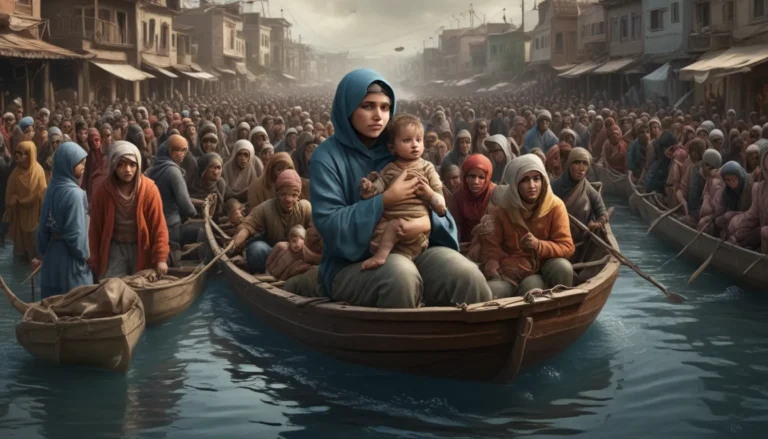A Note About Images: The images used in our articles are for illustration purposes only and may not exactly match the content. They are meant to engage readers, but the text should be relied upon for accurate information.
Political systems are the backbone of governance, guiding how decisions are made, power is distributed, and resources are allocated within a country or region. Each political system, whether it be a democracy, monarchy, or communism, has its unique characteristics that shape the lives of its citizens. In this article, we will embark on a fascinating journey through 15 intriguing facts about political systems from around the globe. Whether you are a political science enthusiast, an avid traveler, or simply curious about different forms of government, this article aims to provide you with a deep understanding of political systems and their impact on societies.
Understanding the Diversity of Political Systems
Political systems vary widely across the world, showcasing diverse ways countries make decisions and govern their people. From the United States’ two-party dominance to Switzerland’s direct democracy, each system reflects unique cultural, historical, and societal influences. Let’s explore some key takeaways that highlight the fascinating diversity of political systems globally.
- The world’s political systems vary from two-party dominance in the US to direct democracy in Switzerland, showcasing diverse ways countries make decisions and govern their people.
- From compulsory voting in Australia to an absolute monarchy in Saudi Arabia, political systems around the world reflect unique cultural, historical, and societal influences.
Unveiling Intriguing Facts About Political Systems
Let’s delve into some fascinating facts about political systems in countries across the globe. Each fact reveals a unique facet of governance and sheds light on the complexities of political structures.
The United States: Two-Party System
In the United States, the political landscape is dominated by two major parties: the Democrats and the Republicans. This system has been in place since the early days of the country, shaping the political discourse and competition within the nation.
Switzerland: Direct Democracy
Switzerland is known for its unique political system, which includes elements of direct democracy. Swiss citizens have the power to propose and vote on laws, making their voices directly heard in the political process.
The United Kingdom: Constitutional Monarchy
The political system in the United Kingdom combines elements of a constitutional monarchy and a parliamentary democracy. While the monarchy is symbolic, the Prime Minister and Parliament hold the actual decision-making power.
China: Communist Political System
China operates under a communist political system, with the Communist Party of China holding authority over the government and guiding its policies and decision-making processes.
Germany: Federal Parliamentary Republic
Germany’s political system is characterized by a federal parliamentary republic, where power is divided between the federal government and the individual states, with a Chancellor serving as the head of government.
North Korea: Totalitarian Regime
In North Korea, the political system is characterized by a totalitarian regime, with the ruling Kim dynasty exercising complete control over all aspects of government and society.
India: Largest Democracy
India is not only the world’s second-most populous country but also the largest democracy. Indian citizens have the right to vote and participate in the political process.
Japan: Constitutional Monarchy
Similar to the United Kingdom, Japan also has a constitutional monarchy. The Emperor serves as a symbolic figurehead, while the Prime Minister and Parliament hold the real political power.
Sweden: Multi-Party System
In Sweden, the political system is characterized by a multi-party system, where several parties compete for seats in the Riksdag (Swedish Parliament), often leading to coalition governments and cooperative decision-making.
Australia: Compulsory Voting
Australia is known for its compulsory voting system, which requires all eligible citizens to vote in federal elections. Failure to do so without a valid reason can result in fines or penalties.
The Netherlands: Proportional Representation
The political system in the Netherlands uses proportional representation, where the number of seats a party receives in the Parliament is directly proportional to the number of votes it receives in the elections.
Brazil: Presidential System
Brazil operates under a presidential system, where the President serves as both the head of state and the head of government, elected through a popular vote.
Saudi Arabia: Absolute Monarchy
Saudi Arabia is governed by an absolute monarchy, where the King holds ultimate power and makes all major decisions, ruling based on Islamic law.
Canada: Parliamentary Democracy
Canada follows a parliamentary democracy, with the Prime Minister as the head of government, a multi-party system, and the Governor General representing the British monarch as the head of state.
South Africa: Mixed Electoral System
In South Africa, the political system uses a mixed electoral system, combining elements of proportional representation and constituency-based voting for national and regional representation.
Conclusion: Navigating the Complexities of Political Systems
Political systems play a crucial role in shaping governance and the functioning of a nation. These fascinating facts about political systems shed light on the diversity and complexities of governing structures worldwide. Understanding how political systems work is essential for citizens to actively participate in shaping policies and making informed decisions. As political systems evolve over time, they adapt to meet the changing needs and aspirations of society.
Whether you are a student of political science or simply curious about the world around you, exploring the intricate world of political systems offers a deeper understanding of governing a nation and its impact on our lives.
FAQs: Exploring Common Questions About Political Systems
-
What is a political system?
A political system refers to the framework of rules, institutions, and practices that govern and shape the distribution of power within a society or nation. -
How many types of political systems are there?
Various types of political systems exist globally, including democracy, republic, monarchy, totalitarianism, communism, and socialism, among others. -
How does democracy differ from other political systems?
Democracy emphasizes individual rights, participation, and majority rule, with power vested in the people through elected representatives or direct voting processes. -
What are common political ideologies associated with political systems?
Political ideologies such as liberalism, conservatism, socialism, communism, and fascism shape beliefs and values guiding political systems and policies. -
How are political leaders elected in different political systems?
Election processes vary, involving voting by eligible citizens or representatives through predefined procedures like direct elections, electoral college systems, or parliamentary votes. -
Can political systems change over time?
Yes, political systems evolve through reforms, revolutions, or shifts in public opinion, adapting to new challenges and societal progress. -
How does the political system affect the lives of ordinary citizens?
The political system influences rights, socio-economic policies, education, healthcare, and governance, impacting various aspects of people’s lives. -
Are there countries without a political system?
Every country has some form of political system to govern effectively, even if it differs from conventional definitions or norms. -
Is a perfect political system possible?
Striving for a perfect political system involves ongoing discussions and efforts to balance societal needs and governance realities, acknowledging each system’s strengths and weaknesses. -
How can I learn more about political systems?
Explore academic resources, enroll in political science courses, follow credible news sources, and engage in discussions with experts and peers to deepen your understanding of political systems.
Embracing the Depth of Political Systems
Political systems are the foundation of governance, influencing every aspect of a nation’s functioning. As we navigate through the diverse array of political systems worldwide, we gain a deeper appreciation for the complexities of governing structures and the impact they have on societies. Whether you are an aspiring political scientist or a curious learner, exploring these fascinating facts about political systems opens doors to a world of knowledge and understanding. Let’s continue to unravel the intricacies of political systems and embrace the richness and diversity of governance across the globe.






